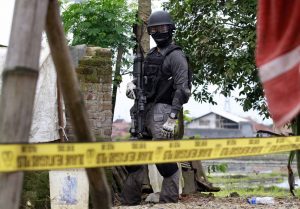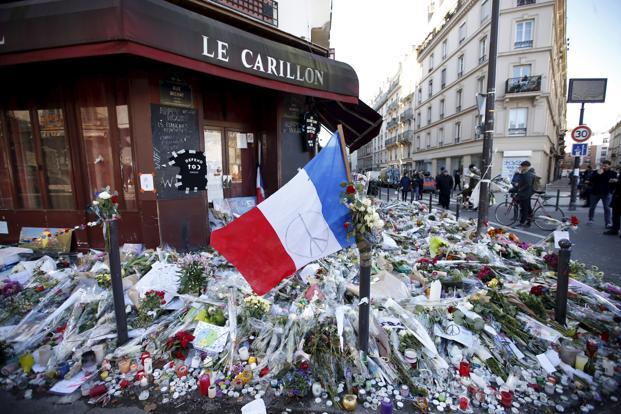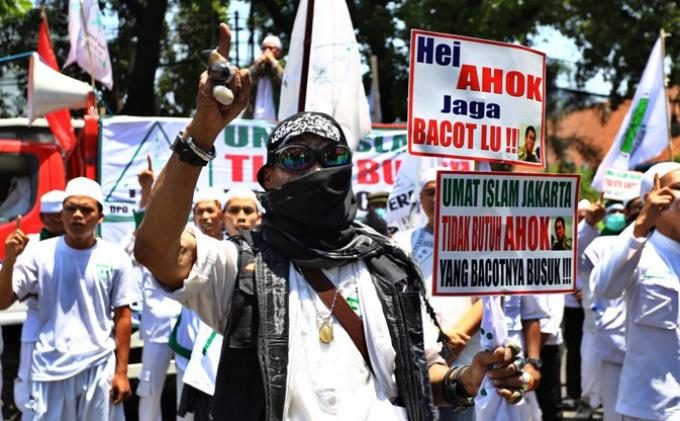
By: Megan White
In the War on Terror, the United States has traditionally been portrayed as the powerful warrior hero. Indonesia, however, has proved that heroism is not always measured by brute strength.
According to the Ancient Greek mythological tradition, the legendary hero Heracles was tasked with slaying the Hydra as one of his twelve labors. The challenge of the assignment lay in the nature of the beast: the Hydra was a venomous, serpent-like creature with “more heads than vase-painters could paint,” and each time a head was cut off, two more would regenerate in its place. Because the creature posed a non-traditional problem, Heracles had no choice but to defeat it with a non-traditional approach. Each time he cut off a head, the hero cauterized the stump with a firebrand, preventing a new head from growing back and extinguishing the problem at its source. Through a combination of force and critical thinking, Heracles brought down the mighty monster and moved on to his next labor.
Long thought to be dead and encased within the mythological realm, the Hydra reared its many heads again at the close of the 20th century following the collapse of the Soviet Union. Though it manifested itself in a variety of forms, tension between the United States and the USSR had dominated the global landscape for nearly half a century. Suddenly, with the flick of a pen, the beast had been decapitated, and from its stump had grown a whole new set of problems. At a March 2000 press conference, former CIA Director James Woolsey explained the post-Cold War state of the world: “It’s as if we were fighting with a dragon for some 45 years and slew the dragon and then found ourselves in a jungle full of a bewildering variety of poisonous snakes.” Still caught in a Cold War mentality, the United States was not prepared for a smaller, more elusive enemy.
Perhaps the most dangerous and widespread of these “snakes” was jihadist terrorism. Following the attacks of September 11, 2001, the United States led the charge into a global “War on Terror,” advocating a direct, military-oriented approach to eliminating terror networks and their logistical supply lines. While this top-down, one-size-fits-all strategy has arguably seen success in the short term, it has focused on eliminating the terrorist, not the terrorism. The Washington approach, though perhaps the loudest, is not the only play in the book. In the search for the solution to James Woolsey’s jungle of snakes, strategists may need to look no further than the jungle itself: Indonesia.
In Indonesia, terrorism came to center stage after the bombing of a Bali nightclub in October 2002, an attack that killed 202 and injured an additional 240. The bombing, carried out by the country’s leading Islamist sect Jemaah Islamiah (JI), came as a surprise, awakening the Indonesian public to the presence of homegrown terrorism in the archipelago. Composed of 17,000 islands with porous maritime borders, widespread corruption, and a loosely regulated financial system, the most populous Muslim country in the world quickly gained a reputation as a safe haven for terrorists.
Between 2002 and 2009, Indonesia saw four additional major terrorist attacks. During that time, the Indonesian government established Special Detachment 88, a Special Forces counterterrorism squad funded, equipped, and trained by the United States and Australia. With over 400 personnel drawn from the elite of Indonesia’s police force and an extensive intelligence network, Detachment 88 is adept at undercover operations, stakeouts, and stings. In 2010, the unit shut down a terrorist training camp deep in the jungles of Sumatra, arresting 14 militants and foiling an imminent attack. Less than a month later, Detachment 88 engaged in a firefight with and killed Dulmatin, an Afghan-trained explosives expert with a $10 million bounty on his head.
Though guided by the Washington model of combating terrorism with militaristic force, the Indonesian style of counterterrorism is not all about raids and shootouts. Rather, its success lies in its softer, bottom-up approach. Instead of treating radicals as terrorists, Detachment 88 treats them as good people gone astray. Through deradicalization programs, the unit has worked toconvince militants of the error of their ways, establishing community outreach programs and encouraging theological discussions with Koranic scholars. During interrogation sessions, Detachment 88 officers, the majority of whom are Muslim, greet prisoners in Arabic and often join them in worship. Agents offer incentives to prisoners who cooperate such as paying their children’s tuition, providing their wives with employment, or allowing prison weddings. Though it requires a greater degree of patience, this personal, hearts-and-minds approach is working: Indonesian police have reported that of the 400-plus terrorism suspects in custody in 2010, approximately half have either cooperated with police or renounced violence. In the aftermath of the raid, JI splintered. The country has not seen a major terrorist attack since 2009.
Detachment 88’s “kid gloves” approach is likely the child of the country’s recent history. Under Suharto, a military strongman who ruled from 1967 to 1998, the people of Indonesia were subject to draconian law and a powerful internal security service. Now, as inhabitants of the world’s third-largest democracy, Indonesians are wary of the military and have therefore placed the country’s counterterrorism efforts in the hands of the police and have required that terrorists be persecuted publicly through the normal court system. This stands in sharp contrast to Guantánamo Bay’s indefinite holding of detainees, a system that only nurtures further radicalization.
As the War on Terror continues on multiple fronts around the world, the United States has much to learn from Indonesia. The traditional “4-D” approach to counterterrorism outlined in the 2003 U.S. National Strategy for Combating Terrorism (NSCT) calls for defeating terrorist organizations, denying further sponsorship, defending the homeland, and diminishing the underlying conditions that terrorists seek to exploit. While the United States has performed well in the first three components of the strategy, it has been fighting a Hydra. Until Washington can focus on the fourth “D” – diminishing the underlying conditions that enable radicalization – it will continue to fight an uphill battle. New terror cells will rise to replace the old ones, and they will be fueled by increasing outrage at American treatment of militants. Without an adjustment in strategy, the United States’ story is unlikely to resemble that of Heracles, but rather that of Sisyphus, doomed to push the same boulder up a hill for eternity.

